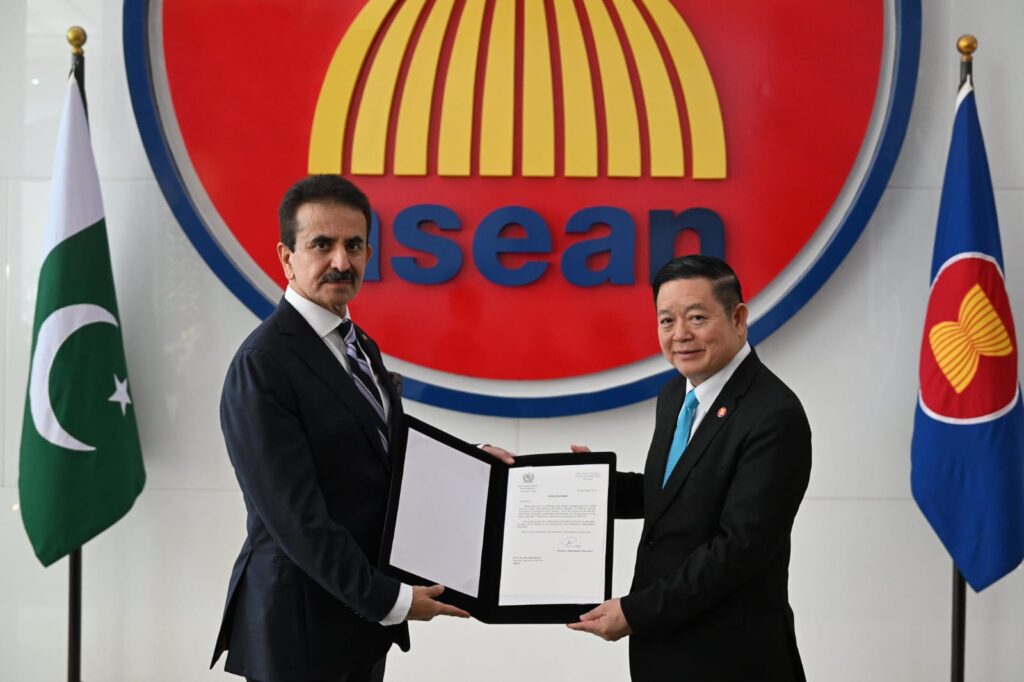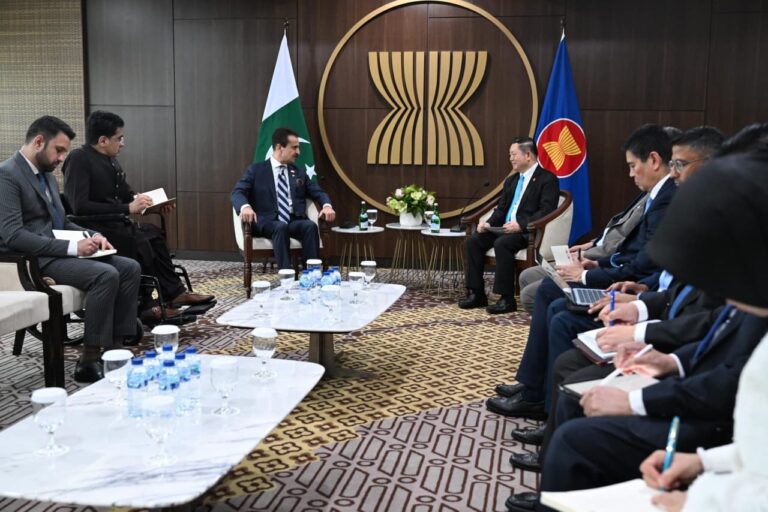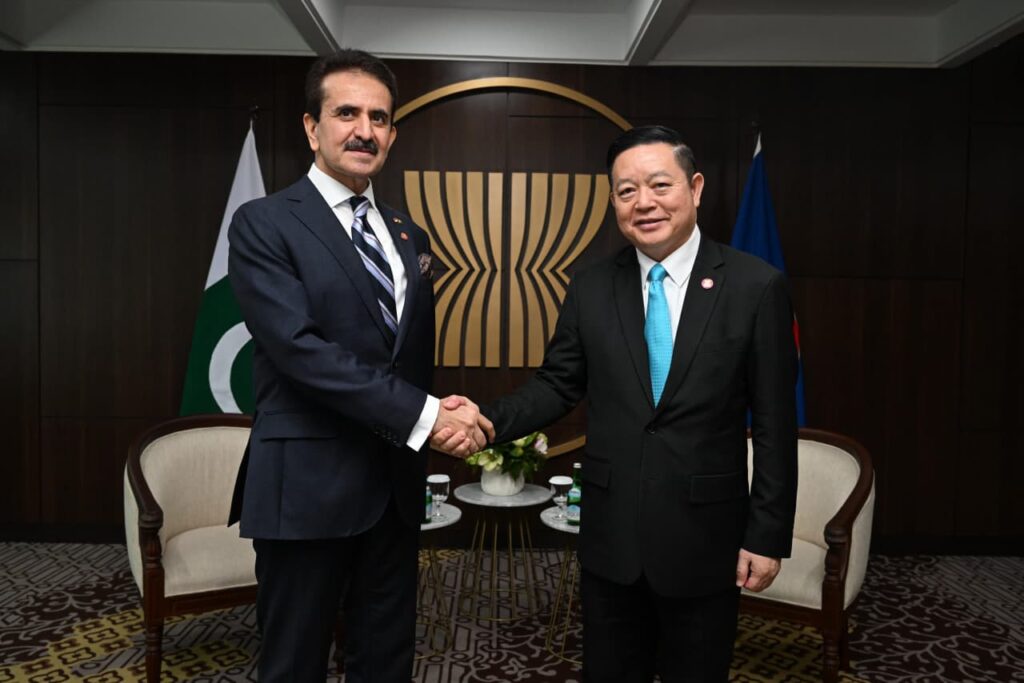BILATERAL RELATION WITH ASEAN



History
The Association of Southeast Asian Nations (ASEAN) was established on August 8, 1967, in Bangkok, Thailand, when the Foreign Ministers of Indonesia, Malaysia, the Philippines, Singapore, and Thailand signed the Bangkok Declaration. Other Southeast Asian countries, including Brunei Darussalam, Cambodia, Laos, Vietnam, and Myanmar, joined the bloc later in the years, making it a 10-member organization. Accepting Timor-Leste’s ASEAN admission application, it was granted observer status in November 2022. It will soon become the 11th member of the organization.
Pakistan’s Engagement with ASEAN
Pakistan’s interest in Southeast Asia predates ASEAN’s establishment. Pakistan was among the first countries to establish diplomatic relations with the newly independent countries of the region. In 1954, Pakistan became a member of the Manila Pact, a defense treaty focused on Southeast Asia. This treaty established the Southeast Asia Treaty Organization (SEATO) with United States assistance. Pakistan was the only non-Southeast Asian country to sign the treaty, joining the Philippines and Thailand.
When ASEAN was established in 1967, Pakistan already had close relations with its founding members. Its formal association with the organization began after ASEAN granted it a “Sectoral Dialogue Partner” (SDP) status in 1993. This partnership covered trade, industry, investment, the environment, science and technology, drug enforcement, tourism, and human resource development. To further strengthen ties with ASEAN countries, Pakistan in 1997 unveiled its “Vision East Asia” policy and acceded to the Treaty of Amity and Cooperation in 2004. The same year, Pakistan was admitted to the ASEAN Regional Forum (ARF). In 1999, Pakistan applied for a “Full Dialogue Partnership” (FDP) status with ASEAN. The request is still pending, as ASEAN imposed a moratorium on establishing FDPs until modalities are negotiated and approved. The moratorium was lifted in 2022 by granting FDP status to the United Kingdom.
ASEAN-Pakistan Joint Sectoral Cooperation Committee (APJSCC)
Pakistan’s association with ASEAN was institutionalized through the establishment of the ASEAN-Pakistan Joint Sectoral Cooperation Committee (APJSCC). The APJSCC met in Bali, Indonesia on February 5, 1999. So far, eight APJSCC meetings have been held, with the last in February 2025.
During the 8th meeting of the APJSCC held in Jakarta, both sides decided to implement Practical Areas of Cooperation (2024-2028), outlining specific areas of cooperation. In addition, they identified several future projects. Pakistan and ASEAN agreed to promote regional connectivity, inter-civilization dialogue, and maritime security cooperation.
The two sides decided to expand cooperation in a wide range of areas, including counterterrorism, violent extremism, and transnational crimes. They also agreed to cooperate in economic development, food and agriculture, science and technology, information and communication technology, tourism, disaster management, culture, human resource development, connectivity, narrowing the development gap, and initiatives for ASEAN integration.
ASEAN-Pakistan Cooperation Fund (APCF).
To expand collaboration in the eight designated areas of cooperation and finance joint initiatives, the ASEAN-Pakistan Cooperation Fund was established in August 1999 with a contribution of US$ 100,000 by Pakistan. Subsequently, in 2006, Pakistan made another contribution of US$ One million to the fund. Several cooperative projects have been carried out through the Fund, including the First Meeting of the ASEAN-Pakistan Business Council and the ASEAN-Pakistan Workshop on Trade Facilitation in February 2000, the Workshop on Industrial Applications and Composite Design in October 2002, the Multimedia Training and Resources Development in November-December 2006, and the ASEAN-Pakistan Workshop on Geo-Informatics in September 2007. Other events included the Pakistan-ASEAN Workshop on Halal Food Production Technology and Certification System in March 2009, as well as the Joint Feasibility Study for the ASEAN-Pakistan Free Trade Agreement (FTA). A conference on Materials Science was held in Vietnam, and a joint ASEAN-Pakistan photo exhibition was held at the ASEAN Secretariat in 2011. The third ASEAN-Pakistan Conference on Materials Science (APCOMS) was held in 2014.
In 2020, ASEAN approved Pakistan’s proposal to conduct three brief diplomatic courses for ASEAN diplomats at the Foreign Service Academy of Pakistan. The first course was held in September 2022. Eleven (11) diplomats from the ASEAN Member States participated in that course. The second course is scheduled for September 19-25, 2023, and the third course in 2024. Another training program focused on the digital payment landscape and financial inclusion in emerging markets for central bank officials of ASEAN member states, was successfully conducted from May 8-12, 2023. A third event, “the Pakistan-ASEAN Business Opportunities Conference” is scheduled to be held in Pakistan in August 2023. Fifty business executives from 10 ASEAN member states are expected to participate in the conference.
ASEAN Regional Forum (ARF)
The ARF was created in 1993 to foster constructive dialogue and consultation among ASEAN Members and the countries having interests in the region’s security. Pakistan became its member in 2004 and since then has remained actively involved in the forum. It has consistently participated in the forum’s activities and made constructive contributions to its aims and objectives. Foreign Minister Bilawal Bhutto Zardari led the Pakistani delegation to the 29th Ministerial Meeting of the ASEAN Regional Forum (ARF) held in Phnom Penh, Cambodia from August 4-6, 2022. The Foreign Minister participated in discussions regarding political and security concerns in the region. The goal was to promote collaborative solutions to festering political and security issues through dialogue and cooperation.
ASEAN-Pakistan Trade
ASEAN is one of Pakistan’s major trading partners, with trade volume reaching an all-time high of over US$ 11 billion in 2022. However, the trade balance is highly tilted in favor of ASEAN countries. Pakistan’s exports to ASEAN countries were US$3.3 billion in 2022, while imports were $8.83 billion in the same year. Ninety percent of Pakistan’s trade is with five ASEAN countries: Malaysia, Thailand, Vietnam, the Philippines, and Indonesia. In 2024, the trade volume between ASEAN and Pakistan was US$ 10.45 billion with Pakistan’s exports to ASEAN stood at US$ 2.52 billion and imports from ASEAN states stood at US$ 7.9 billion.
Pakistan has a Free Trade Agreement (FTA) with Malaysia and a Preferential Trade Agreement (PTA) with Indonesia. Furthermore, negotiations for a Free Trade Agreement (FTA) with Thailand are going on, and discussions regarding a Preferential Trade Agreement (PTA) with Vietnam are currently underway.
Future prospects
Pakistan remains committed to collaboration with ASEAN in diverse fields. In light of globalization’s advancement, ASEAN is aiming to become an even more dynamic, powerful segment of the global supply chain in the future. In addition, it is striving to expand its reach beyond the ASEAN Economic Community borders to become a truly global player. Pakistan can help ASEAN achieve this objective in many ways.
Pakistan’s strategic location at the crossroads of key regions presents a valuable opportunity for ASEAN to access the western regions of China, Central Asia, and the Middle East. Pakistan is naturally endowed with a key role in promoting Asian connectivity. Similarly, as a country located on the Indian Ocean Rim, Pakistan has a vested interest in the Malacca Strait’s security. It shares ASEAN’s concerns regarding big power’s rivalry in the region. It also supports the organization’s centrality in managing regional affairs. Pakistan believes that the development of its Gwadar port as a sea corridor for Western China would reduce the traffic burden in the Malacca Straits.
Pakistan is the only South Asia country that belongs to three significant regional organizations – SAARC, ECO, and SCO. This links South Asia with Central Asia and the Middle East. Pakistan is thus well-positioned to contribute to inter-regional connectivity. Pakistan’s abundant workforce and investment incentives make it an ideal location for ASEAN investors to establish manufacturing units for marketing products in the Middle East, Central Asia, and Western China. ASEAN’s investors can also take advantage of the incentives provided to investors in the special economic zones established along the CPEC route. This will boost their exports to the Pakistani market and beyond.